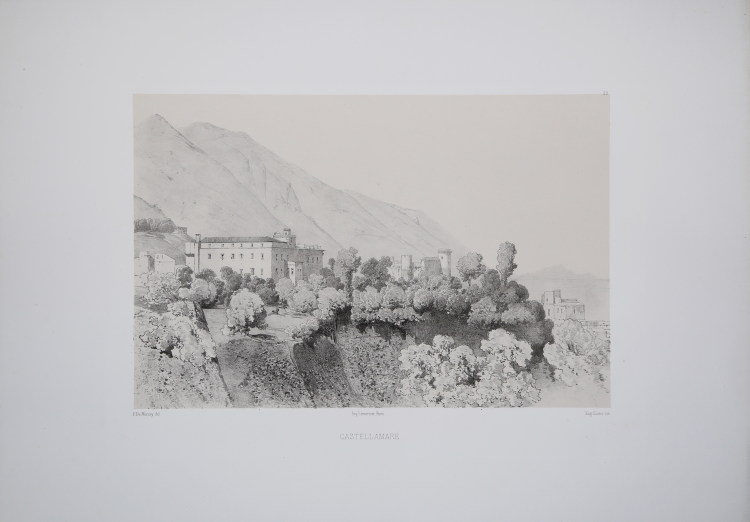



| Reference: | S48696 |
| Author | Frédéric Bourgeois De Mercey |
| Year: | 1858 |
| Zone: | Castellammare di Stabia |
| Printed: | Paris |
| Measures: | 570 x 400 mm |


| Reference: | S48696 |
| Author | Frédéric Bourgeois De Mercey |
| Year: | 1858 |
| Zone: | Castellammare di Stabia |
| Printed: | Paris |
| Measures: | 570 x 400 mm |
Rare tinted lithograph drawn "d'apres nature" by Frederic Bourgeois de Mercey, lithographed by Eugene Ciceri and printed by Lemercier in Paris.
It was published in the collection La Toscana e le Midi d'Italie. Notes de voyages, étude et recit, published in 1858.
Frédéric Bourgeois de Mercey, was born on May 20, 1803 in Paris and died on September 6, 1860 at La Faloise Castle. He was a French painter, travel writer, art critic and novelist.
He was born in Paris to Louis-Frédéric, who lived in the kingdom of Naples in the service of Joachim Murat. Returning to France at the end of the Decade, our writer's father devoted himself to the study of the fine arts. This cultural climate directed Frédéric Bourgeois' choices. Initially he devoted himself to painting, specializing in landscape (his views are preserved in the great French museums); then he was called to the Ministry of the Interior as head of Fine Arts, until he reached the rank of minister of state. He visited the Peninsula at length, particularly Tuscany and the Mezzogiorno. A politician with a democratic orientation, a profound connoisseur of the classical and medieval Italian world, he published numerous works. He dealt with the Coast in an article for the 1840 "Revue des Deux-Mondes" La République d'Amalfi, poured, later, into the volume La Toscana e le Midi d'Italie. Notes de voyages, étude et recit (Paris 1858), accompanied by an album of lithographs based on the many drawings he was taking on his tours.
Tinted lithograph, very good condition.
Frédéric Bourgeois De Mercey (Parigi 1803 - 1860)
|
Frédéric Bourgeois de Mercey, was born on May 20, 1803 in Paris and died on September 6, 1860 at La Faloise Castle. He was a French painter, travel writer, art critic and novelist.
He was born in Paris to Louis-Frédéric, who lived in the kingdom of Naples in the service of Joachim Murat. Returning to France at the end of the Decade, our writer's father devoted himself to the study of the fine arts. This cultural climate directed Frédéric Bourgeois' choices. Initially he devoted himself to painting, specializing in landscape (his views are preserved in the great French museums); then he was called to the Ministry of the Interior as head of Fine Arts, until he reached the rank of minister of state. He visited the Peninsula at length, particularly Tuscany and the Mezzogiorno. A politician with a democratic orientation, a profound connoisseur of the classical and medieval Italian world, he published numerous works. He dealt with the Coast in an article for the 1840 "Revue des Deux-Mondes" La République d'Amalfi, poured, later, into the volume La Toscana e le Midi d'Italie. Notes de voyages, étude et recit (Paris 1858), accompanied by an album of lithographs based on the many drawings he was taking on his tours.
|
Frédéric Bourgeois De Mercey (Parigi 1803 - 1860)
|
Frédéric Bourgeois de Mercey, was born on May 20, 1803 in Paris and died on September 6, 1860 at La Faloise Castle. He was a French painter, travel writer, art critic and novelist.
He was born in Paris to Louis-Frédéric, who lived in the kingdom of Naples in the service of Joachim Murat. Returning to France at the end of the Decade, our writer's father devoted himself to the study of the fine arts. This cultural climate directed Frédéric Bourgeois' choices. Initially he devoted himself to painting, specializing in landscape (his views are preserved in the great French museums); then he was called to the Ministry of the Interior as head of Fine Arts, until he reached the rank of minister of state. He visited the Peninsula at length, particularly Tuscany and the Mezzogiorno. A politician with a democratic orientation, a profound connoisseur of the classical and medieval Italian world, he published numerous works. He dealt with the Coast in an article for the 1840 "Revue des Deux-Mondes" La République d'Amalfi, poured, later, into the volume La Toscana e le Midi d'Italie. Notes de voyages, étude et recit (Paris 1858), accompanied by an album of lithographs based on the many drawings he was taking on his tours.
|